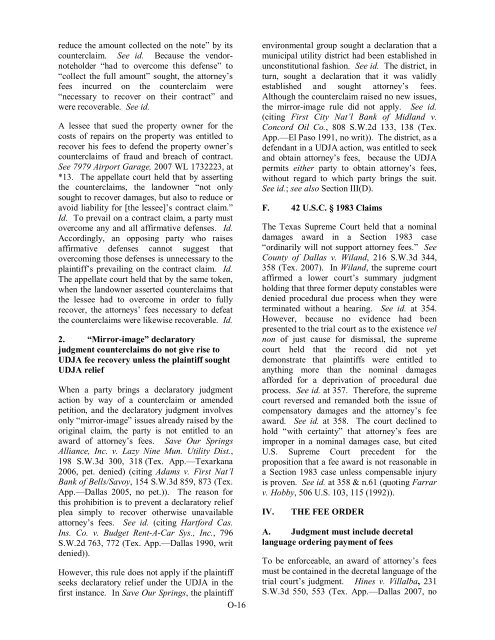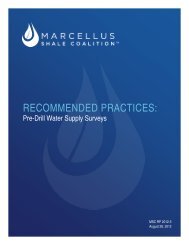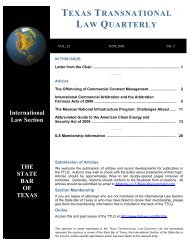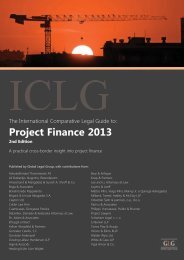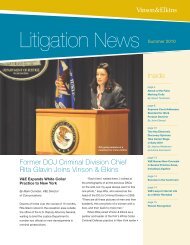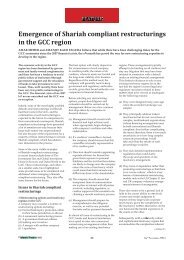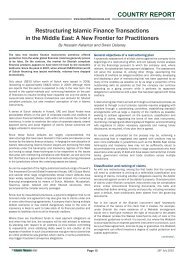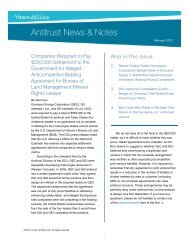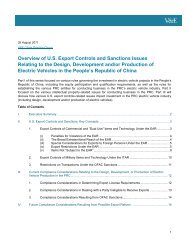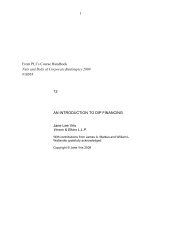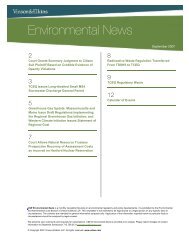Attorney's Fees Update - Vinson & Elkins LLP
Attorney's Fees Update - Vinson & Elkins LLP
Attorney's Fees Update - Vinson & Elkins LLP
Create successful ePaper yourself
Turn your PDF publications into a flip-book with our unique Google optimized e-Paper software.
educe the amount collected on the note” by its<br />
counterclaim. See id. Because the vendornoteholder<br />
“had to overcome this defense” to<br />
“collect the full amount” sought, the attorney’s<br />
fees incurred on the counterclaim were<br />
“necessary to recover on their contract” and<br />
were recoverable. See id.<br />
A lessee that sued the property owner for the<br />
costs of repairs on the property was entitled to<br />
recover his fees to defend the property owner’s<br />
counterclaims of fraud and breach of contract.<br />
See 7979 Airport Garage, 2007 WL 1732223, at<br />
*13. The appellate court held that by asserting<br />
the counterclaims, the landowner “not only<br />
sought to recover damages, but also to reduce or<br />
avoid liability for [the lessee]’s contract claim.”<br />
Id. To prevail on a contract claim, a party must<br />
overcome any and all affirmative defenses. Id.<br />
Accordingly, an opposing party who raises<br />
affirmative defenses cannot suggest that<br />
overcoming those defenses is unnecessary to the<br />
plaintiff’s prevailing on the contract claim. Id.<br />
The appellate court held that by the same token,<br />
when the landowner asserted counterclaims that<br />
the lessee had to overcome in order to fully<br />
recover, the attorneys’ fees necessary to defeat<br />
the counterclaims were likewise recoverable. Id.<br />
2. “Mirror-image” declaratory<br />
judgment counterclaims do not give rise to<br />
UDJA fee recovery unless the plaintiff sought<br />
UDJA relief<br />
When a party brings a declaratory judgment<br />
action by way of a counterclaim or amended<br />
petition, and the declaratory judgment involves<br />
only “mirror-image” issues already raised by the<br />
original claim, the party is not entitled to an<br />
award of attorney’s fees. Save Our Springs<br />
Alliance, Inc. v. Lazy Nine Mun. Utility Dist.,<br />
198 S.W.3d 300, 318 (Tex. App.—Texarkana<br />
2006, pet. denied) (citing Adams v. First Nat’l<br />
Bank of Bells/Savoy, 154 S.W.3d 859, 873 (Tex.<br />
App.—Dallas 2005, no pet.)). The reason for<br />
this prohibition is to prevent a declaratory relief<br />
plea simply to recover otherwise unavailable<br />
attorney’s fees. See id. (citing Hartford Cas.<br />
Ins. Co. v. Budget Rent-A-Car Sys., Inc., 796<br />
S.W.2d 763, 772 (Tex. App.—Dallas 1990, writ<br />
denied)).<br />
However, this rule does not apply if the plaintiff<br />
seeks declaratory relief under the UDJA in the<br />
first instance. In Save Our Springs, the plaintiff<br />
O-16<br />
environmental group sought a declaration that a<br />
municipal utility district had been established in<br />
unconstitutional fashion. See id. The district, in<br />
turn, sought a declaration that it was validly<br />
established and sought attorney’s fees.<br />
Although the counterclaim raised no new issues,<br />
the mirror-image rule did not apply. See id.<br />
(citing First City Nat’l Bank of Midland v.<br />
Concord Oil Co., 808 S.W.2d 133, 138 (Tex.<br />
App.—El Paso 1991, no writ)). The district, as a<br />
defendant in a UDJA action, was entitled to seek<br />
and obtain attorney’s fees, because the UDJA<br />
permits either party to obtain attorney’s fees,<br />
without regard to which party brings the suit.<br />
See id.; see also Section III(D).<br />
F. 42 U.S.C. § 1983 Claims<br />
The Texas Supreme Court held that a nominal<br />
damages award in a Section 1983 case<br />
“ordinarily will not support attorney fees.” See<br />
County of Dallas v. Wiland, 216 S.W.3d 344,<br />
358 (Tex. 2007). In Wiland, the supreme court<br />
affirmed a lower court’s summary judgment<br />
holding that three former deputy constables were<br />
denied procedural due process when they were<br />
terminated without a hearing. See id. at 354.<br />
However, because no evidence had been<br />
presented to the trial court as to the existence vel<br />
non of just cause for dismissal, the supreme<br />
court held that the record did not yet<br />
demonstrate that plaintiffs were entitled to<br />
anything more than the nominal damages<br />
afforded for a deprivation of procedural due<br />
process. See id. at 357. Therefore, the supreme<br />
court reversed and remanded both the issue of<br />
compensatory damages and the attorney’s fee<br />
award. See id. at 358. The court declined to<br />
hold “with certainty” that attorney’s fees are<br />
improper in a nominal damages case, but cited<br />
U.S. Supreme Court precedent for the<br />
proposition that a fee award is not reasonable in<br />
a Section 1983 case unless compensable injury<br />
is proven. See id. at 358 & n.61 (quoting Farrar<br />
v. Hobby, 506 U.S. 103, 115 (1992)).<br />
IV.<br />
THE FEE ORDER<br />
A. Judgment must include decretal<br />
language ordering payment of fees<br />
To be enforceable, an award of attorney’s fees<br />
must be contained in the decretal language of the<br />
trial court’s judgment. Hines v. Villalba, 231<br />
S.W.3d 550, 553 (Tex. App.—Dallas 2007, no


